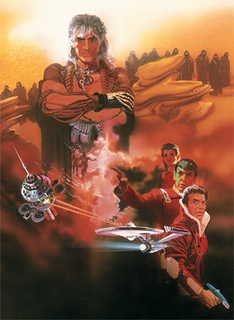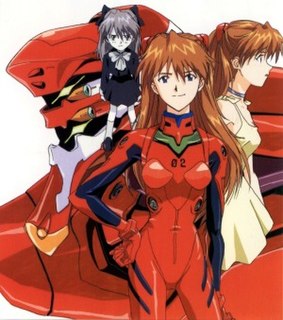
Neon Genesis Evangelion is a Japanese mecha anime television series produced by Gainax and animated by Tatsunoko, directed by Hideaki Anno and broadcast on TV Tokyo from October 1995 to March 1996. The cast included Megumi Ogata as Shinji Ikari, Kotono Mitsuishi as Misato Katsuragi, Megumi Hayashibara as Rei Ayanami, and Yūko Miyamura as Asuka Langley Soryu. Music for the series was composed by Shirō Sagisu.

Star Trek II: The Wrath of Khan is a 1982 American science fiction film directed by Nicholas Meyer and based on the television series Star Trek. It is the second film in the Star Trek film series, and is a sequel to Star Trek: The Motion Picture (1979). The plot features Admiral James T. Kirk and the crew of the starship USS Enterprise facing off against the genetically engineered tyrant Khan Noonien Singh, a character who first appeared in the 1967 Star Trek episode "Space Seed". When Khan escapes from a 15-year exile to exact revenge on Kirk, the crew of the Enterprise must stop him from acquiring a powerful terraforming device named Genesis. The film is the beginning of a three-film story arc that continues with the film Star Trek III: The Search for Spock (1984) and concludes with the film Star Trek IV: The Voyage Home (1986).

The Sega CD, released as the Mega-CD in most regions outside North America and Brazil, is a CD-ROM accessory for the Mega Drive/Genesis produced by Sega as part of the fourth generation of video game consoles. It was released on December 12, 1991 in Japan, October 15, 1992 in North America, and April 2, 1993 in Europe. It plays CD-based games and adds hardware functionality such as a faster central processing unit and graphic enhancements such as sprite scaling and rotation. It can also play audio CDs and CD+G discs.

Genesis are an English rock band formed at Charterhouse School, Godalming, Surrey, in 1967. The band's most commercially successful line-up consists of keyboardist Tony Banks, bassist/guitarist Mike Rutherford and drummer/singer Phil Collins. The 1970s line-up featuring singer Peter Gabriel and guitarist Steve Hackett was among the pioneers of progressive rock.

Philip David Charles Collins is an English drummer, singer, record producer, songwriter and actor. He is best known as the drummer/singer of the rock band Genesis and for his solo career. Between 1982 and 1990, Collins achieved three UK and seven US number-one singles in his solo career. When his work with Genesis, his work with other artists, as well as his solo career is totalled, he had more US top 40 singles than any other artist during the 1980s. His most successful singles from the period include "In the Air Tonight", "I Don't Care Anymore", "Against All Odds ", "One More Night", "Sussudio", "Take Me Home", "Two Hearts", "A Groovy Kind of Love", "I Wish It Would Rain Down", and "Another Day in Paradise".
In the history of computer and video games, the fourth generation of game consoles began on October 30, 1987 with the Japanese release of NEC Home Electronics' PC Engine. Although NEC released the first console of this era, sales were mostly dominated by the rivalry between Nintendo's and Sega's consoles in North America: the Super Nintendo Entertainment System and the Sega Genesis. Handheld systems released during this time include the Nintendo Game Boy, released in 1989, and the Sega Game Gear, first released in 1990.

Asuka Langley Soryu is a fictional character from the anime Neon Genesis Evangelion, created by Gainax. Within the series, she is designated as the Second Child and the pilot of a giant mecha named Evangelion Unit 02, to fight against enemies known as Angels for the special agency Nerv. Because of childhood trauma, she has developed a competitive and outgoing character, to get noticed by other people and affirm her own self. Yūko Miyamura voices Asuka in Japanese in all her animated appearances and merchandise, while in English Tiffany Grant voices her in the ADV Films dub and Stephanie McKeon voices her in the Netflix dub. She appears in the franchise's animated feature films and related media, video games, the original net animation Petit Eva: Evangelion@School, the Rebuild of Evangelion films, and the manga adaptation by Yoshiyuki Sadamoto. In the Rebuild of Evangelion films, her Japanese surname is changed to Shikinami (式波).

Jurassic Park: Operation Genesis is a construction and management simulation video game based on the Jurassic Park series developed by Blue Tongue Entertainment and co-published by Vivendi Universal Games under their Universal Interactive subsidiary and Konami. It was released for Windows, Xbox, and PlayStation 2. The game's primary goal is to construct a five-star rated dinosaur theme park named Jurassic Park on custom-generated islands by hatching dinosaurs, building attractions, keeping visitors entertained, and ensuring the park's safety.

The End of Evangelion is a 1997 Japanese psychological science fiction anime film written and co-directed by Hideaki Anno and animated by Gainax and Production I.G. It serves as a parallel ending to the Neon Genesis Evangelion television series, in which teenage Shinji Ikari pilots Evangelion Unit 01, one of several giant humanoid mechas designed to defend against the hostile supernatural entities called Angels. The film picks up where the television show's 24th episode ended, and the cause of the events depicted in the show's episodes 25 and 26 occurs in the middle.

Neon Genesis Evangelion: Death & Rebirth, romanized in Japan as Evangelion: Death & Rebirth, is a 1997 Japanese animated psychological science fiction film. It is the first installment of the Neon Genesis Evangelion film series and consists of two parts, Evangelion: Death and Evangelion: Rebirth. It was released, along with the follow-up, The End of Evangelion, in response to the success of the TV series and a strong demand by fans for another ending. It has since been re-edited and re-released several times.

Adam is a figure in the Book of Genesis of the Hebrew Bible and Christian Bible, and also in the Quran. According to the creation myth of the Abrahamic religions, he was the first man. In both Genesis and Quran, Adam and his wife were expelled from the Garden of Eden for eating the fruit of the tree of knowledge of good and evil.

Genesis II is the second experimental space habitat designed and built by the private American firm Bigelow Aerospace, launched in 2007. As the second module sent into orbit by the company, this spacecraft builds on the data and experience gleaned from its previously orbited sister-ship Genesis I. Like its sister-ship and other modules being designed by Bigelow Aerospace, this spacecraft is based on the NASA TransHab design, which provides increased interior volume and reduced launch diameter along with potentially reduced mass compared to traditional rigid structures.
Iron Maiden are a British heavy metal band.
The Neon Genesis Evangelion franchise has had various soundtracks, remix albums and compilations released around it. The franchise has sold more than 9 million albums and singles.
Neon Genesis Evangelion is a Japanese media franchise created by Hideaki Anno and owned by Khara. Most of the franchise features an apocalyptic mecha action story, which revolves around the efforts by the paramilitary organization NERV to fight hostile beings called Angels, using giant humanoids called Evangelions that are piloted by select teenagers. Subsequent works deviate from this theme to varying degrees, focusing more on romantic interactions between the characters, plotlines not present in the original works, and reimaginings of the conflicts from the original works.










